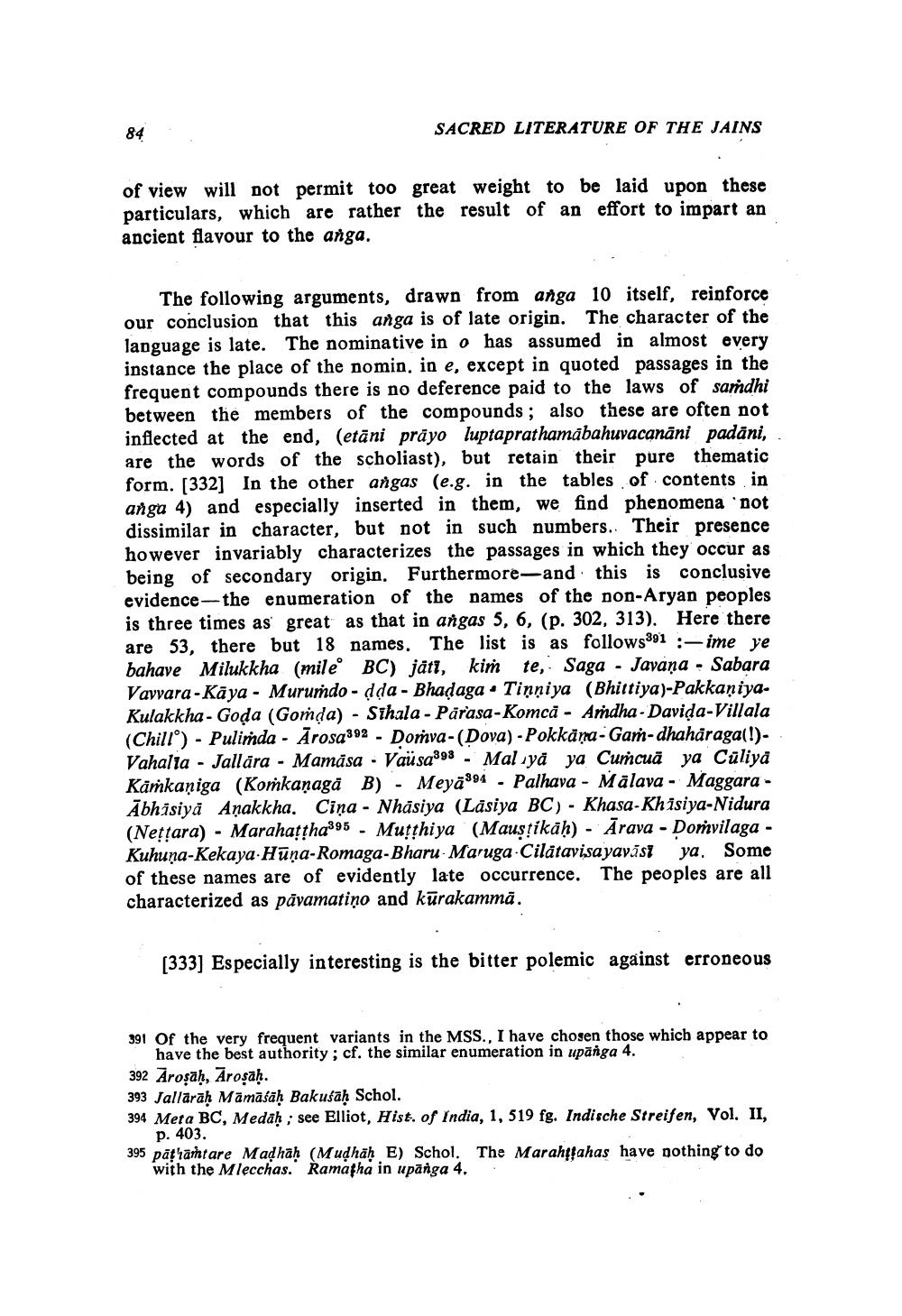________________
84
.
SACRED LITERATURE OF THE JAINS
of view will not permit too great weight to be laid upon these particulars, which are rather the result of an effort to impart an ancient flavour to the anga.
The following arguments, drawn from anga 10 itself, reinforce our conclusion that this anga is of late origin. The character of the language is late. The nominative in o has assumed in almost every instance the place of the nomin. in e, except in quoted passages in the frequent compounds there is no deference paid to the laws of sardhi between the members of the compounds; also these are often not inflected at the end, (etāni prāyo luptaprathamabahuvacanāni padāni, are the words of the scholiast), but retain their pure thematic form. [332] In the other angas (e.g. in the tables of contents in anga 4) and especially inserted in them, we find phenomena 'not dissimilar in character, but not in such numbers. Their presence however invariably characterizes the passages in which they occur as being of secondary origin. Furthermore--and this is conclusive evidence- the enumeration of the names of the non-Aryan peoples is three times as great as that in angas 5, 6, (p. 302, 313). Here there are 53, there but 18 names. The list is as follows391 :- ime ye bahave Milukkha (mile' BC) jäti, ki te, Saga - Javaņa - Sabara Vavvara-Kāya - Muruído - dda - Bhadaga - Tiņņiya (Bhittiya)-Pakkaniya. Kulakkha - Goda (Goṁda) - Sihala - Parasa-Komca - Arndha - Davida-Villala (Chillo) - Pulimda - Ārosa392 - Domva-(Dova) - Pokkaņa-Gam-dhaharagal!). Vahalia - Jallāra - Mamāsa - Vaüsa393 - Mal iya ya Cuscuã ya Cūliya Kāṁkaņiga (Komkaņagă B) - Meyā894 - Palhava - Mālava - Maggara - Abhisiya Anakkha. Ciņa - Nhasiya (Lasiya BC) - Khasa-Khisiya-Nidura (Nettara) - Marahatpha395 - Mutthiya (Maustikah) - Ārava - Dorvilaga - Kuhuna-Kekaya-Hūņa-Romaga-Bharu-Maruga-Cilätavisa yavāsı ya. Some of these names are of evidently late occurrence. The peoples are all characterized as pāvamatiņo and kūrakammā.
[333] Especially interesting is the bitter polemic against erroneous
391 Of the very frequent variants in the MSS., I have chosen those which appear to
have the best authority ; cf. the similar enumeration in upanga 4. 392 Aroşāḥ, Aroșāḥ. 393 Jallarāḥ Māmāśaḥ Bakušāḥ Schol. 394 Mera BC, Medah ; see Elliot, Hist. of India, 1, 519 fg. Indische Streifen, Vol. II,
p. 403. 395 pāghamtare Madhāḥ (Mudhāh E) Schol. The Marahffahas have nothing to do
with the Mlecchas. Ramatha in upanga 4.




